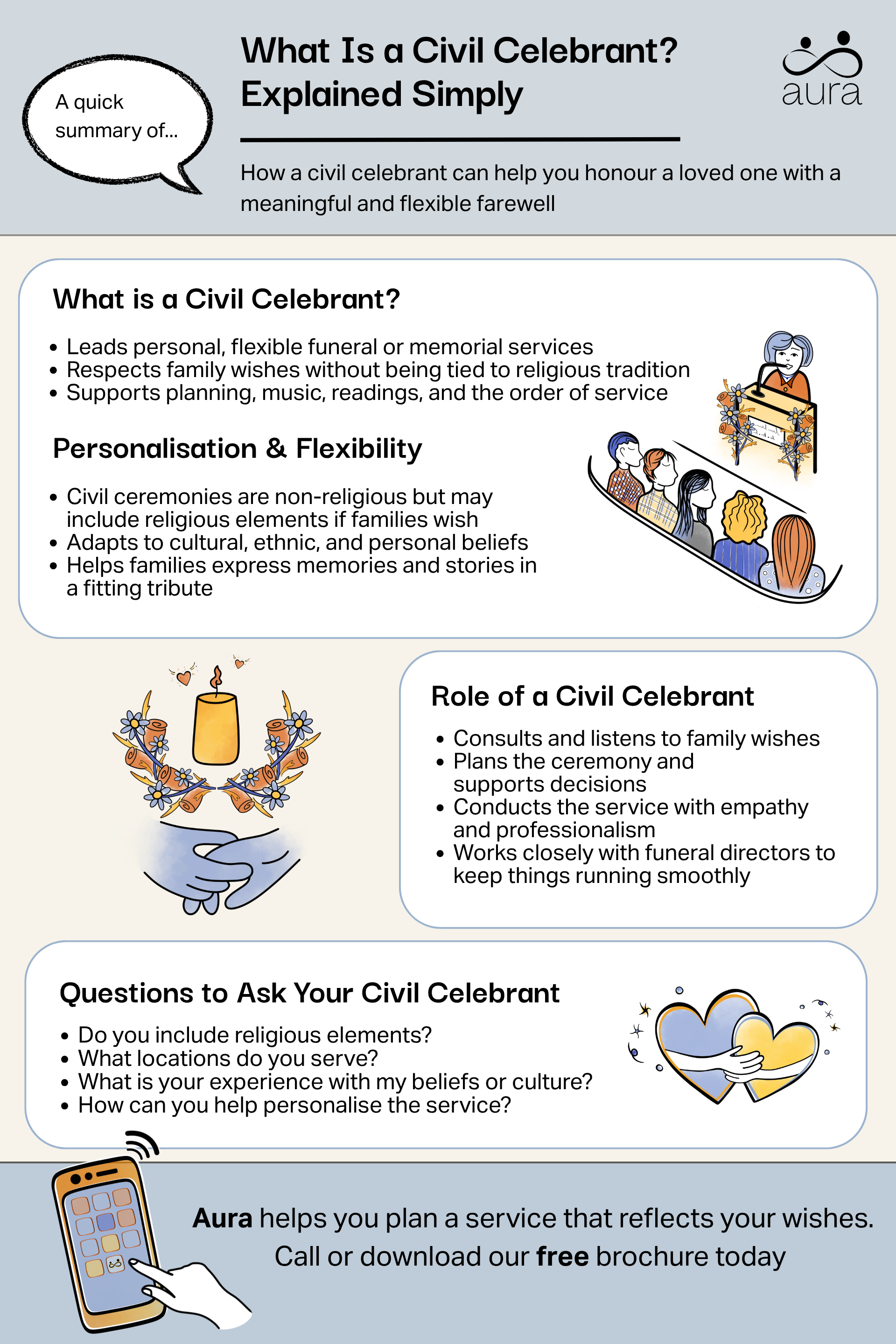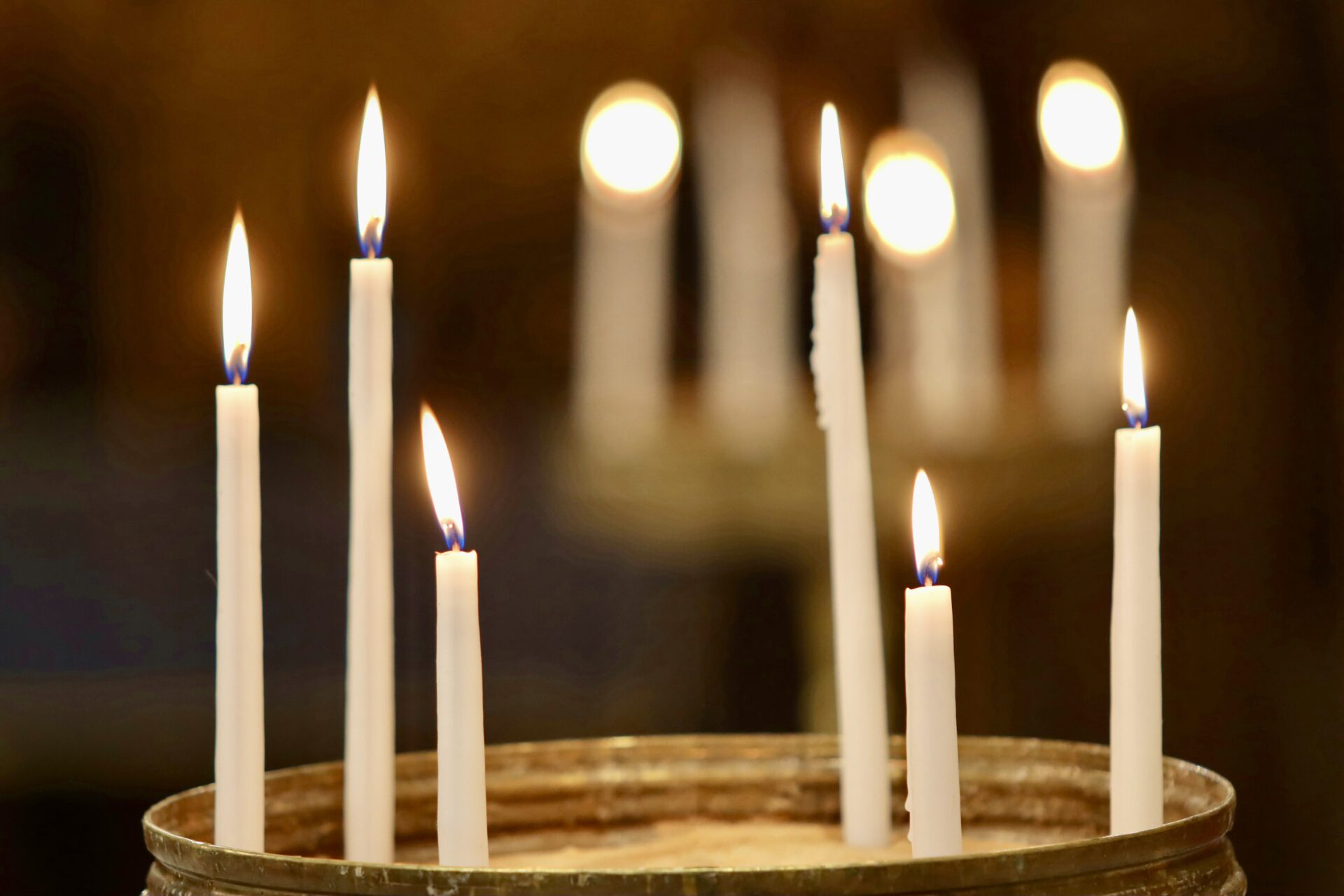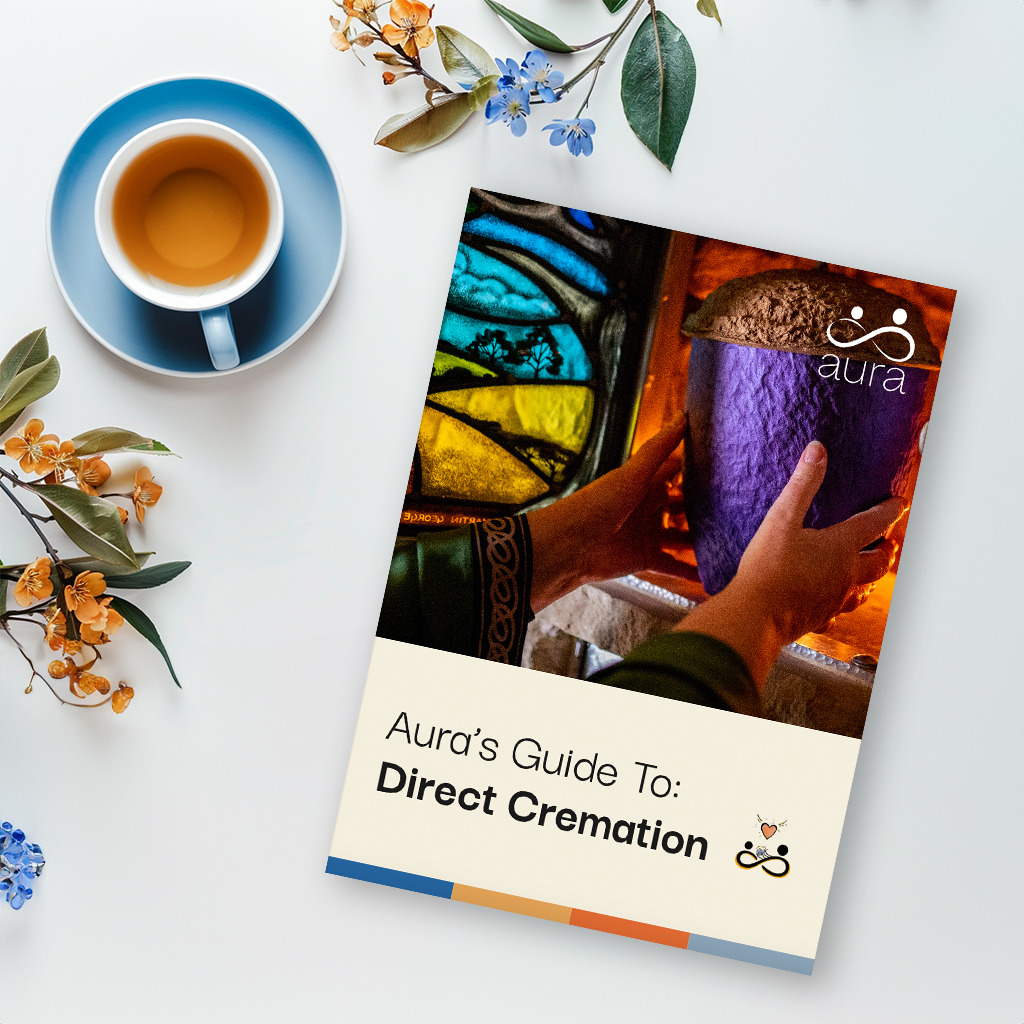


Written by Emily Cross.
17 minute read

Organising a funeral to pay your respects to a loved one who has died may not be straightforward, and can even feel overwhelming.
We understand how hard it can be to strike the right balance. You may want to include personal touches, while also feeling constrained by traditional choices. One option that many families find helpful is working with a funeral celebrant. But what is a funeral celebrant? They’re someone who helps you create and lead a ceremony that reflects the life and wishes of the person who has died. Some celebrants include religious elements if you’d like, while others focus entirely on a non-religious or semi-religious approach.
Civil celebrants are a type of funeral celebrant who conduct non-religious funerals, or flexible ceremonies. They work closely with you to create something personal, meaningful and respectful—without following a set script or tradition.
In this guide, we’ll walk you through what you need to know about civil celebrants, including how they might help you shape a service that feels right for you and your family.
Key takeaways:

A civil celebrant is simply a professional who conducts any type of funeral or memorial service in line with the wishes of the family.
They will typically be heavily involved with helping the family to choose things such as music, funeral poems and readings, as well as outlining the order of the service and associated timings. Civil celebrants are typically chosen for their flexibility and willingness to blend traditional religious elements with more personal inclusions. They are not bound by the traditions of a religious officiant.
You may also come across the term ‘humanist celebrant’ which while similar in many ways, has one important difference. Humanist celebrants focus on highly personalised secular funeral services and so while they may include popular funeral hymns and religious songs in their services, they would not be available for the inclusion of prayers and other religious rituals.
Civil celebrant meaning in a UK context
As a professional who can conduct a funeral, civil celebrants focus on a personalised approach to outlining, planning, and delivering the service with the aim of following the family’s wishes to the smallest fine detail.
Although civil celebrants will typically be non-religious, their main focus is personalising the service in a way that pays respect to the person who has died. As such, it is common for them to include religious elements at the direction of the family, and to do so in a way that is not bound by the traditions observed by a religious officiant.
Choosing a civil celebrant allows you to shape a service that feels more personal—especially if you’d prefer something less traditional. With someone experienced by your side, who can bring professionalism while blending non-religious values with any meaningful traditions you’d like to keep, the result can feel truly your own.
Custom ceremonies that reflect the individual’s life allow you to pay your respects, remember them, and say your goodbyes in a way that you feel is fitting. In a world where we are all unique and have our own journey through life, you may wish to continue along this path during the service. Families sometimes find a great sense of comfort and reassurance from doing so because it can help them feel closer, more connected, and even feel the energy of the person who has died.
It’s completely understandable if all of this feels overwhelming right now. Amid everything you’re processing, know that a good civil celebrant will also be someone who offers emotional support. People drawn to this role are often chosen for their kindness, compassion, and ability to listen—qualities that can bring real comfort in the lead-up to the service.
A civil funeral is a non-religious ceremony that honours the life of the person who has died without you having to strictly adhere to more traditional religious elements. While many traditional faith-based services are typically rooted in many centuries of history and have both spoken and unspoken codes of tradition, a civil funeral can be anything you want it to be.
If you wish to focus on the person’s values, life story, and relationships, this more modern funeral style may be worth closer consideration. Some families may find that this is an opportunity to tell the story of the life of the person who has died in a way that invites others to share memories and remember happier times.
While a civil funeral led by a civil celebrant may take virtually any form you wish, it may be useful to consider a basic structure of welcome, tribute, readings, music, and a heartfelt farewell. Although this may sound rather similar to the more traditional religious services many of us have attended before, this is largely where the similarity ends.
Each component of the service can be changed and adapted —non-religious music for example, might be used: modern funeral songs, alternative live music, and even fun and uplifting funeral songs are all options. Non-religious funeral poems and other less expected readings may also be chosen.
Hiring the services of a civil celebrant may help you to work through each step of the service and arrive at something that you feel is a fitting tribute.
Civil funerals are held in a variety of different locations and are not constrained by the more traditional venues used for religious funerals. Public crematoriums, natural burial sites, community venues, and even suitably sized family homes are all choices you may wish to consider with other members of the family.
Because you’re approaching things from a non-traditional, highly personalised starting point, you have much more freedom with the location, timing, and format. This can help you strike the right balance between celebrating a life, paying respects, and being mindful of the wider family’s wishes. It’s also useful if you’re bringing together people from different cultural or religious backgrounds—especially when trying to honour elements of British funeral traditions while still doing things your own way.

The role of a civil funeral celebrant begins with the initial contact and continues all the way through to delivering and concluding the service. It is a role with a great deal of family interaction and responsibility, and it is one that requires professionalism, empathy, and client-centred communication.
To provide a clearer idea of the role, we can break it up into three parts:
Celebrants work with families to understand the life and wishes of the person who has died by listening to their thoughts, feelings, and memories. It’s a case of gathering facts, information, and sentiments in a way that doesn’t overwhelm the family or make them feel like they are being formally interviewed.
Once the celebrant has a clear idea of the direction the family wishes to take, they can begin writing and drafting personalised scripts. Every civil funeral is different, but you may wish to consider some or all of the following: readings, eulogies, poems, and memories. Each one may help to provide a new light in which all of those in attendance can see the person who has died.
Civil celebrants also take on a great deal of responsibility when it comes to supporting families through a difficult time. While they’re not therapists or psychologists, and that’s not their role, many naturally become someone families feel they can talk to—especially when emotions are running high. They manage the tone of the service, the timings that help everything flow, and the quiet logistics happening in the background. Celebrants are often known for their calm presence and ability to adapt to last-minute changes or unspoken wishes with quiet empathy.
For some families, their presence becomes an unexpected source of comfort as they begin to process their grief.
When you are deciding that you wish to break with tradition, it is understandable if you have a thought in the back of your mind when it comes to the legal side of things. We’re here to clear this up so that you can plan a service or ceremony in a way that you feel is right.
Civil funerals are not legal processes in the way that marriages are and therefore do not require any form of registration. While a marriage is recorded by the signing of the marriage certificate during the ceremony, a death is recorded when the death certificate is issued, and this is not done at the funeral. Although the celebrants will liaise with funeral directors and crematorium staff with respect to timings and logistics, they play no role in the official death registration.
In many ways, the role of celebrants is split between providing a comforting source of support and focus for the family and coordinating with funeral professionals to ensure everything goes as expected. For the service to flow smoothly from one stage to the next, and for everyone in attendance to feel like their needs have been met, the celebrant must exhibit clear communication at all times. They have a responsibility to make sure that all parties involved understand how the service will unfold and what is expected of them.
Our guide on the price of funeral celebrants may be helpful at this point. We have also created some resources on arranging a low-cost cremation that you may also find helpful to refer to when you feel ready.
While every service is different in terms of length, style, and location, it may be helpful for us to provide an approximate range of £180 to £300 or more. Each celebrant will be able to guide you through what they can provide and whether or not they have any tiered packages you may wish to consider.
As well as planning meetings, writing various parts, and leading the service, the civil celebrant will be able to guide you through your options in a way that never makes you feel like you’re being rushed into a decision.
In addition to the various tangible elements we’ve already touched upon, the chief role of the celebrant is to provide you with a way to personalise the service. They will be emotionally attentive to your needs, know when to give you space and time, and will be able to create a plan that makes you feel like you are always in control of the process.
The personal nature of the service a celebrant can offer is something many families may feel is a natural fit for them. With this in mind, you may wish to budget for hiring the services of a celebrant as part of drawing up a list of overall funeral costs and sorting out how to pay for a funeral. This can help you find the right balance at a time when you want to make sure your wishes are listened to.
We’ve written previously about inclusive options such as celebration-of-life ideas that allow you to pay your respects in a way that feels natural. A civil celebrant can help you implement these ideas, and more, by providing a guiding hand at a time when you may feel pulled in several different directions.
Civil celebrants are experts when it comes to adapting to different cultural, ethnic, and family backgrounds. They can also accommodate a wide range of religious beliefs on funerals that may be present in the wider family. By helping to ensure the tone of the service accurately and sincerely reflects the person who has died, the celebrant will allow you to remember them in a way befitting of their memory. This is achieved by a flexible, open-minded approach on the part of the celebrant.
Creating lasting memories through ceremony
Some families may find that approaching the ceremony as a way to share the life story of the person who has died can help with the healing process. It’s a chance to share anecdotes, elaborate on feelings, and create new memories by reminiscing in a group setting.
A civil celebrant will help you to achieve this in a way that feels sincere and authentic so that each of you in attendance can start talking about bereavement and potentially gain closure. A personalised service itself can serve as a starting point for a new stage in the grieving process as it provides an opportunity to sit, reflect, and think about the person who has died.
In our experience, taking a personal approach to remembering someone you love may help provide support with grief and death. Some families find it helpful to combine this type of personal approach with options such as our direct cremation services so that they create a non-traditional funeral or memorial without being quite so tightly bound by tradition. And if you are thinking about how to structure your own affairs when you die, you may find that our prepaid funeral plans are helpful, too.
We hope you have found some words of comfort and support in our guide and want to let you know that we are always right here when you need us. As a family-run funeral provider that cares about doing the right thing, we’re always looking for ways to make our industry more accessible and more comforting to people from all walks of life.
Explore our online resources today and you’ll find guides that compare funeral plans, articles that lay out direct cremation prices, and dozens of other pieces of content we hope are helpful. When you need us, we are always right here.

If you’d like more information about direct cremation and Aura’s funeral plans, then our downloadable guide can help. Find out why others are choosing this affordable, no-fuss alternative to traditional funerals and why it might be right for you too.
Download our guide by clicking the link below and learn more about this simple funeral plan option.
A civil celebrant is a professional person who can lead a personalised funeral ceremony or a non-religious funeral ceremony. They are an alternative to the traditional choice of religious officiants and are chosen by some families who feel they better reflect the beliefs and preferences of the person who has died.
How do I find a civil celebrant near me?
Organisations such as The Celebrant Directory and the Association of Independent Celebrants allow you to search by location, ceremony type, and price. Finding a local celebrant that you can meet with in person prior to the funeral service may help you feel more comfortable and aligned with the process.
What types of ceremonies can a civil celebrant conduct?
Civil celebrants can conduct a wide range of milestone events such as symbolic weddings (they are not legally binding), vow renewals, funerals, pet funerals, and naming ceremonies. Choosing a civil celebrant, rather than a religious officiant, is something some families feel better reflects the thoughts and feelings of the person who has died.
Is a civil celebrant legally recognised for marriage?
While a civil celebrant can conduct a wedding, the ceremony is purely symbolic in England and Wales and will not result in a legally binding marriage recognised by UK law. For this to be the case, the couple must also attend a registrar’s office to sign the required legal paperwork. That said, wedding ceremonies in Scotland and Northern Ireland that are directed by a humanist celebrant do result in a legally binding marriage.
How does a civil celebrant personalise a service?
The role of the civil celebrant in the preparation for the service is to speak with the family and learn everything they can about the thoughts, personality, and final wishes of the person who has died. They will use this information and further guidance from surviving family members and close friends to create a ceremony that tells a story that aligns with the wishes of the family. Much thought is given to choices such as the songs, music, readings, and poems that may form part of the service.
What are the costs of hiring a civil celebrant?
Prices will vary by location, the length of the service, and the specific choices of the family. You can view typical celebrant prices online and connect with a celebrant if you so wish. You may find that taking your time so that you can reflect on how you would like the service to take shape allows you to clarify your thinking. It is understandable to be caught in several minds at a time when you are also processing grief and coming to terms with the death of someone you love.
Can a civil celebrant conduct both weddings and funerals?
Yes, many civil celebrants choose to conduct both types of services while others prefer to focus on one or the other. Finding someone you feel comfortable with and who has experience in conducting funerals will allow you to say goodbye to the person who has died in a way that you feel befits their memory.
staging site last replicated: MISSINGNO.